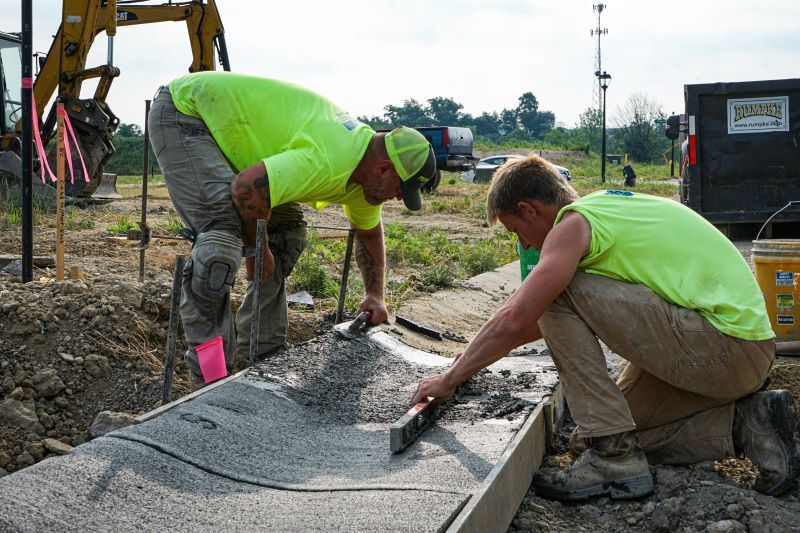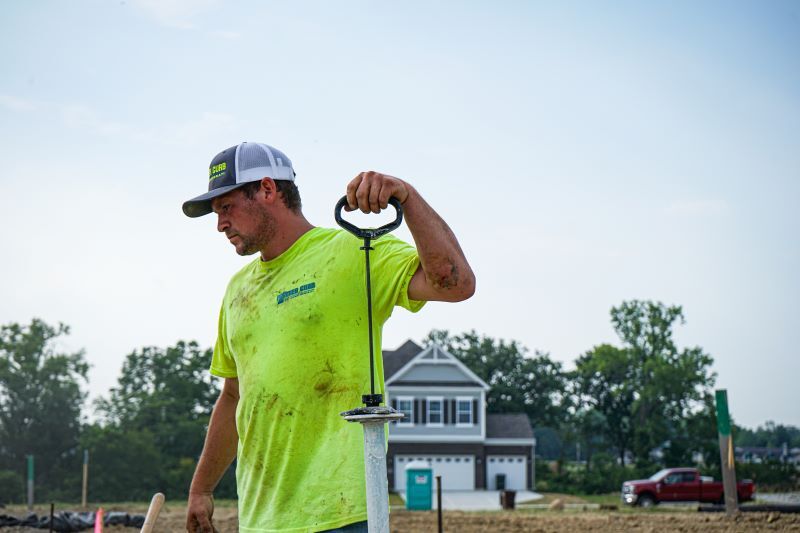The Complete Checklist of Skills for Working with Concrete
.png)
Imagine a day on the job with Mike, a concrete worker who’s been in the game for years. Like every concrete laborer, he starts early, ready to prep, pour, and smooth his way to a finished project. For those who enjoy hands-on work and being part of something solid and lasting, concrete work might just be the perfect fit. This guide covers the tools, techniques, and skills every aspiring concrete laborer needs to know, with insights from Mike’s typical day on the job.
Tools Every Concrete Worker Should Know How to Use
Concrete work calls for a mix of tools, each serving its own purpose. The right tools make the work smoother, faster, and more precise—a quality that sets experienced workers like Mike apart.
Shovels and Rakes
Knowing how to use these basic tools might seem simple, but they lay the foundation for everything that follows. Mike grabs a shovel and rake, trusty tools in any concrete laborer’s kit. These tools might seem simple, but they’re essential for spreading and leveling wet concrete during a pour. Knowing how to maneuver them with precision is the foundation of every job. He scrapes, levels, and spreads wet concrete with a practiced hand, making sure the base layer is smooth.
Concrete Mixers
Concrete consistency is everything, and that’s where the concrete mixer comes in – the machine that makes the job more efficient and accurate. Mike knows the perfect mix makes the difference between a sidewalk that cracks in a year and one that lasts a decade. He carefully measures and mixes, ensuring a smooth and strong blend. Every good concrete worker knows how to keep the mixer clean and adjust for the job, a skill that comes in handy on a busy site.
Screeds
Pouring concrete is not a one man show. While his partner is pouring the concrete, Mike is sliding his screed across the surface to make it level. Screeding is one of those tasks that seems easy until you try it. Getting a smooth finish isn’t just about the right tools; it’s about the touch. Concrete laborer jobs often call for a polished look, and experience with a screed is the key to achieving that look. Mastering this tool means a concrete worker can control the surface finish, ensuring the job looks professional every time.
Floats and Trowels
As the concrete begins to set, Mike pulls out his floats and trowels to perfect the surface. Floats push down any remaining small stones, while trowels bring a fine, polished finish. Different floats—like magnesium, wood, and steel—are used for specific finishes. Knowing how to use each one gives concrete workers the flexibility to meet various project demands.
Edgers and Groovers
Finishing touches matter, so Mike uses edgers and groovers to add clean lines and joints to the concrete. Those lines do more than look good—they help prevent cracks. Curbs and sidewalks demand a clean edge, and a concrete laborer job description always calls for skill with these tools.
Vibrators
When it’s time to make sure the concrete’s solid, Mike uses a concrete vibrator to shake out any air pockets, ensuring that the pour is dense and durable. It’s a step you don’t want to skip; without it, concrete can develop weak spots. A concrete worker with skills in using a vibrator is a valuable team member on any project.

Important Techniques for Effective Concrete Work
Tools are only half the job. To do concrete work right, you need solid techniques, and Mike’s got them. Every concrete worker needs to master the basics before moving on to advanced skills.
Finishing Curbs and Flatwork
Mike’s next move is to finish the curb. Using trowels, he smooths the surface, making sure the curb’s edges are sharp and defined. It takes patience, and he knows when to add a bit of water or to let the concrete set a bit more. These small finishing touches turn a job from “good” to “great” in concrete laborer jobs.
Curb and Flatwork Forming
Setting forms is like building the frame of a house. Mike carefully measures and places forms to shape the curb and sidewalk just right. A strong structure starts with the forms, and every concrete worker needs to learn this essential skill.
Wall Forming and Reinforcement
Today’s job is small, but on larger projects, Mike would be working with wall forms and rebar, tying it together for reinforced strength. Wall forming and steel tying provide stability to concrete, so if you’re aiming for concrete laborer jobs on big projects, these skills are a must.
Pouring and Compacting
Concrete work can get messy. Pouring takes steady hands and good timing. With a skilled pour and compacting technique, Mike’s sidewalks won’t have weak spots. Every concrete contractor knows that skipping steps here could mean doing the whole job over again.

Advanced Skills for Experienced Concrete Workers
As Mike heads into his next project, he’s glad he picked up some advanced skills. Not every project requires them, but when they’re needed, they make a huge difference.
Using Laser Levels and Transit Levels
On bigger sites, Mike uses laser levels for accurate grading and layout. Knowing how to handle high-tech tools like these shows concrete laborers are ready for complex tasks, from grading a site to ensuring every angle’s just right.
Reading Blueprints and Plans
To get a job done right, a concrete worker must know the plan. Mike reviews blueprints to make sure he’s building exactly what the site demands. Concrete jobs often require a keen eye for details like measurements and spacing, and understanding blueprints brings those plans to life.
Understanding Concrete Mixtures
Some jobs call for special mixes, like high-strength concrete for load-bearing structures. Knowing when to adjust the mix is a valuable skill, especially for small job concrete contractors who need flexibility to handle a range of projects.
Join Charles H. Hamilton: Excellence in Concrete Work
As the sun sets on Mike’s workday, he packs up his tools, tired but satisfied. Concrete work takes grit, skill, and patience. Every tool, every skill, every pour—each one adds to the expertise that sets a great concrete worker apart.
At Charles H. Hamilton, we value hard work, commitment, and a job done right. From entry-level laborers to seasoned pros like Mike, we offer opportunities to learn and grow on the job. If you’re looking for “concrete work near me” or exploring a career as a concrete laborer, consider joining us. Our team is built on decades of experience and a reputation for quality. Reach out today, and let’s shape the future of construction together.
If you’re ready to take your career to the next level, check out our open positions here. Whether you’re a seasoned pro or just starting, we offer opportunities to grow and thrive.
Contact us today to learn more about how we can help you build a rewarding career in concrete work.
Follow us on Facebook, Instagram, X, and LinkedIn to stay up to date on our latest projects, tips, and job openings!
Had a great experience with Charles H. Hamilton? Leave us a five-star review here and let us know how we’re doing!

